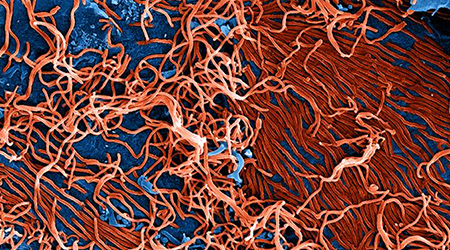The outbreak of Ebola virus disease in West Africa, which started back in December 2013, has resulted in a significant and ongoing death toll, exceeding 9,150 in February 2015. The West African countries of Guinea, Sierra Leone, and Liberia have been devastated by the outbreak, which spread rapidly and widely across the region in large part due to the fragility of local health systems and their inability to detect, assess, and respond to the emerging outbreak effectively.
Rebecca Katz, PhD, MPH, an associate professor of health policy, global health and emergency medicine, and a team of researchers at the Milken Institute School of Public Health (Milken Institute SPH) at the George Washington University have received funding from the Centers for Disease Control and Prevention (CDC) to help close some of these gaps. The project, titled “Building Capacity to Strengthen Emergency Operations Systems and One Health Workforce Development,” will focus on building capacity in Guinea. Ultimately, the team hopes the work there will become a model that can be used in other countries to detect, report, and contain emerging disease threats like Ebola--before they become public health emergencies of international concern.
“This project will help Guinea shore up their emergency operations centers and develop a stronger public health workforce,” said Katz, co-director of The Global Health Security Program, which is a project based at Milken Institute SPH. “Our hope is to strengthen existing operations and expand capacity which would give Guinea the ability to identify future health threats and act swiftly to protect the public.”
Although the current outbreak of Ebola began in an isolated village in Guinea back in December 2013, it took months before the problem was accurately identified; this was coupled with limited internal capacity to track the disease and control the spread to neighboring countries. The end result was a rapidly expanding outbreak with significant potential for further spread both in West Africa and to other regions.
To reduce the risk that this outbreak and future ones will turn into global health security threats, the Global Health Security Program research team will work to strengthen emergency operations centers (EOCs) in Guinea. Such centers function as strategic command centers and are the key to mounting an effective response to a public health threat. The Milken Institute SPH team will not only help strengthen such command centers but will work with partners in Guinea to develop and test plans to prepare all stakeholders – spanning health, agriculture, defense, environment, and other key sectors – and to communicate and work together efficiently and effectively in the event of a public health event.
In addition, the team will assist with efforts to develop a stronger public health workforce. This includes not just epidemiologists and clinical practitioners but also the veterinary medicine specialists who are often the first to see diseases, like Ebola, that can cross from animal into human populations. With the funding, the Global Health Security program team will work closely with the CDC and partners in the African region to develop training courses that will empower health and veterinary professionals with the skills to detect an emerging threat and report it quickly, so that an appropriate and effective response can be mounted.
Other Milken Institute SPH researchers on the project include Julie E. Fischer, PhD, an associate research professor; Ronald Waldman, MD, professor of global health; Erin Sorrell, PhD, MS, a senior research scientist; Claire Standley, PhD, MSc, a senior research scientist, Sarah Kornblet, JD, MPH, a senior research associate and Andrea Vaught, BA, a research assistant—all with The Global Health Security Program.
Photo Credit: NIAID


